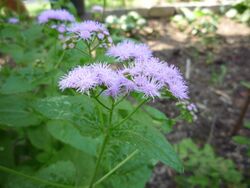Biology:Conoclinium
From HandWiki
Short description: Genus of flowering plants
| Conoclinium | |
|---|---|

| |
| Conoclinium coelestinum | |
| Scientific classification | |
| Kingdom: | Plantae |
| Clade: | Tracheophytes |
| Clade: | Angiosperms |
| Clade: | Eudicots |
| Clade: | Asterids |
| Order: | Asterales |
| Family: | Asteraceae |
| Subfamily: | Asteroideae |
| Tribe: | Eupatorieae |
| Genus: | Conoclinium DC. |
| Species | |
Conoclinium, the mistflowers, is a genus of four[1] species of herbaceous perennial flowering plants, native to North America. They are 0.5 to 2 metres (1.6 to 6.6 ft) tall, and have blue to purple or violet flowers (occasionally white).
The plants of this genus have sometimes been classified in the genus Eupatorium, but late 20th century research shows they are more closely related to other plants of the Eupatorieae, such as Ageratum.[2]
The generic name is derived from the Greek words κῶνος (kônos), meaning "cone", and κλινίον (kliníon), meaning "little bed".[3]
Species
- Conoclinium betonicifolium is found in Texas , Mexico, Guatemala[1][4]
- Conoclinium coelestinum (blue mistflower) is native to eastern and central North America, from Ontario south as far as Florida and Texas .[5] It is often grown as a garden plant, although it does have a tendency to spread and take over a garden.[6] It is recommended for habitat restoration (within its native range), especially in wet soils.[5][7]
- Conoclinium dissectum (synonym C. greggii) is found in the southern United States and Mexico (Arizona, Tamaulipas, New Mexico, Texas , Chihuahua, Coahuila, Durango, Nuevo León, San Luis Potosí, Sonora, Zacatecas).[1][4]
- Conoclinium mayfieldii is found in northern Mexico (Chihuahua, Durango, Tamaulipas)[8]
References
- ↑ 1.0 1.1 1.2 Patterson, Thomas F.; Nesom, Guy L. (2006), "Conoclinium", in Flora of North America Editorial Committee, Flora of North America North of Mexico (FNA), 21, New York and Oxford, http://www.efloras.org/florataxon.aspx?flora_id=1&taxon_id=107871
- ↑ Gregory J. Schmidt; Edward E. Schilling (2000). "Phylogeny and biogeography of Eupatorium (Asteraceae: Eupatorieae) based on nuclear ITS sequence data". American Journal of Botany (Botanical Society of America) 87 (5): 716–726. doi:10.2307/2656858. PMID 10811796.
- ↑ Quattrocchi, Umberto (2000). CRC World Dictionary of Plant Names: A-C. CRC Press. p. 602. ISBN 978-0-8493-2675-2. https://books.google.com/books?id=esMPU5DHEGgC.
- ↑ 4.0 4.1 Turner, B. L. 1997. The Comps of Mexico: A systematic account of the family Asteraceae, vol. 1 – Eupatorieae. Phytologia Memoirs 11: i–iv, 1–272
- ↑ 5.0 5.1 "Conoclinium coelestinum". Natural Resources Conservation Service PLANTS Database. USDA. https://plants.usda.gov/core/profile?symbol=COCO13.
- ↑ Conoclinium coelestinum, Lady Bird Johnson Wildflower Center, University of Texas at Austin, http://www.wildflower.org/plants/result.php?id_plant=COCO13
- ↑ "Conoclinium coelestinum (Eupatorium coelestinum)". Native Plants for Wildlife Habitat and Conservation Landscaping: Chesapeake Bay Watershed. U.S. Fish & Wildlife Service. http://www.nps.gov/plants/pubs/chesapeake/plant/1404.htm.
- ↑ Patterson, T. F. 1996. Phytologia 80: 104-107
External links
- C. coelestinum photo from Photographs of flowering plants of the Ozarks and the interior highlands of North America, by Paul L. Redfearn, Jr.
Wikidata ☰ Q5162107 entry
 |

